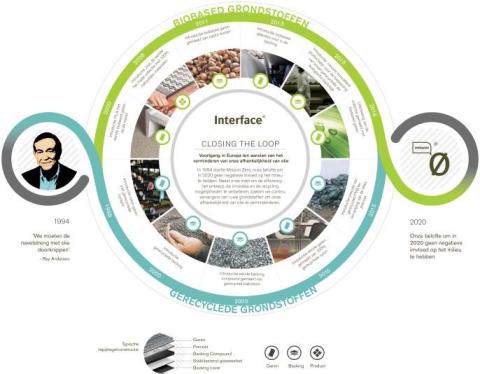Circular Business Models for carpet tiles – Creating a climate fit for life
In 1994, Interface made a public commitment to become restorative by 2020, eliminating any negative impact the company might have. As 2020 approaches and the organisation is on track, working towards 100% renewable energy in production, 100% recycled and biobased materials, having reuse and recycling options available around the globe. Focusing on creating a climate fit for life, Interface is integrating sustainability strategy and vision, innovation and transparency to achieve its circular goals.
Its ReEntry® programme reclaims, reuses carpet tiles in new flooring designs and recycles carpet tiles into new raw materials to create carpet as part of a closed technical loop.
Net-Works™ ensures Interface receives fully recycled nylon for carpet tiles, a true inclusive circular business model through which biodiversity in our oceans is restored by removing ghost nets and local communities have an additional income. Recently the company joined NextWave, a supply web, to ensure ocean plastic finds it’s way into circular supply chains and because of the value of the plastic, it doesn’t end up in the ocean anymore.
Interface’s Mission Zero and Climate Take Back goals have encouraged the company to be more circular in how it both designs and manufactures its products. For example, in Scherpenzeel in the Netherlands, this includes:
- Reducing material waste by 80% each year thanks to an ultrasonic cutting machine;
- Reducing gas consumption by up to 45% per sqm of carpet produced by using a new, more sustainable precoat;
- Recycling up to 600 000 sqm of material each year.
Today, global results show:
- 95% reduction in greenhouse gas emissions worldwide;
- 86% reduction in global water use;
- 87% renewable energy internationally, 100% in Europe;
- Zero waste to landfill in European operations;
- 58% increase in use of biobased and recycled materials worldwide.

